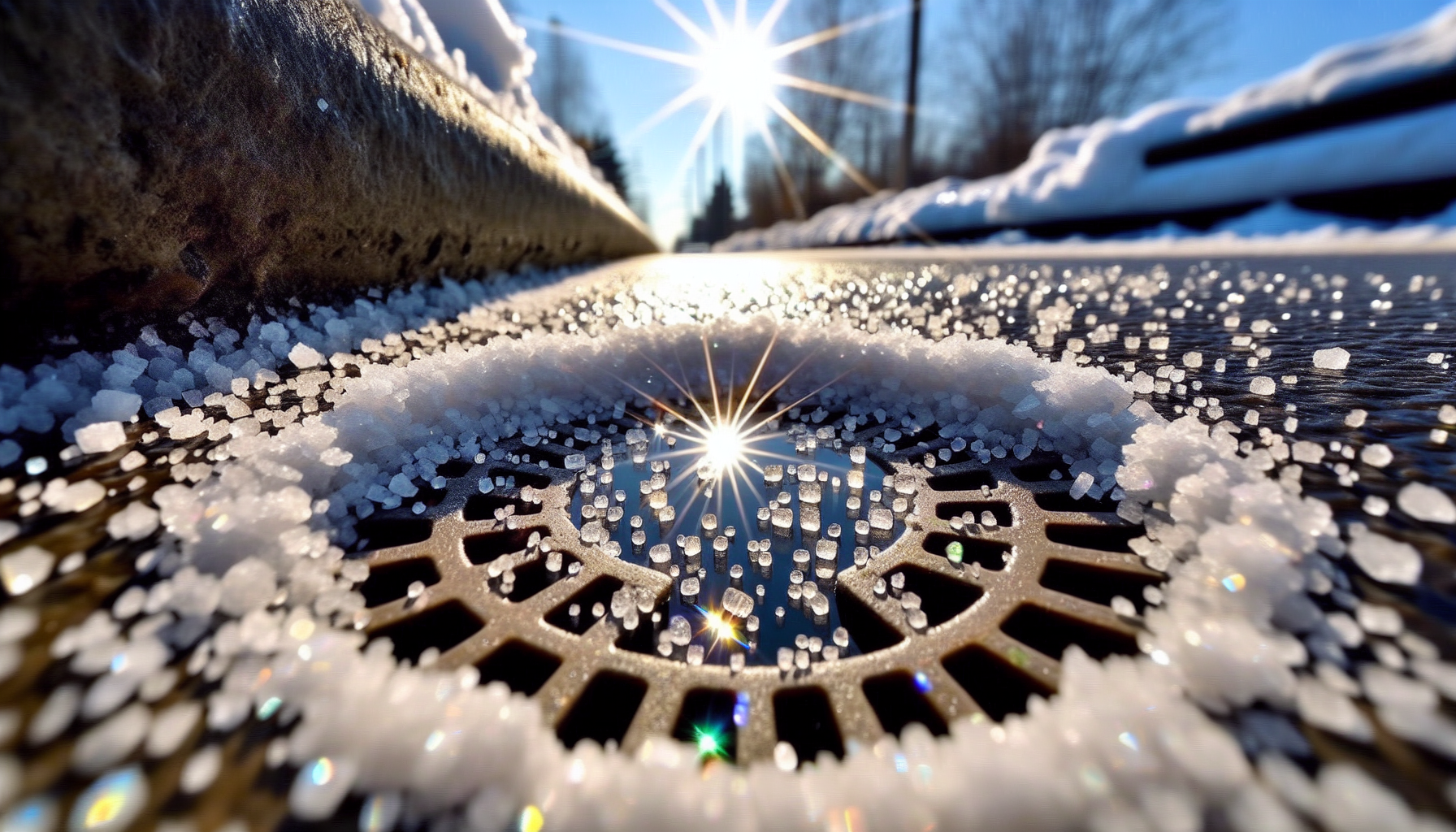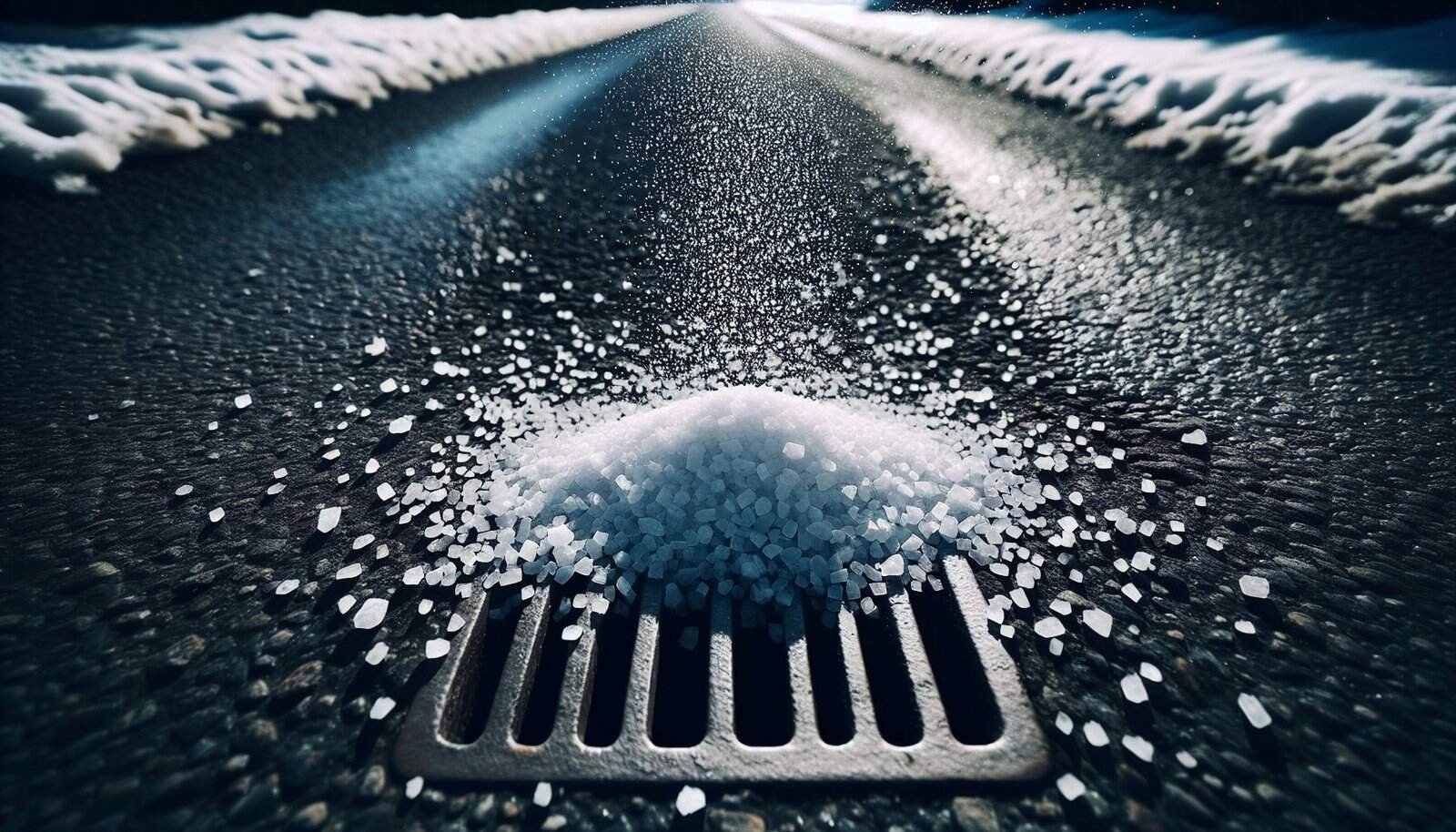Have you ever wondered if the salt used to de-ice roads in winter could be affecting your well water quality? During the colder months, road salt is spread across highways and streets to enhance safety by reducing ice and providing better traction. While it indeed benefits drivers, there’s an underlying concern: could this salt seep into your groundwater, affecting your well water?

Understanding Road Salt and Its Use
When winter approaches, road maintenance teams prepare by stocking up on road salt, primarily sodium chloride, to keep icy roads safe. This common method ensures that snow and ice melt quickly, reducing the risk of accidents. But what happens to this salt after the snow melts and the runoff begins?
What is Road Salt?
Road salt, in its most common form, is akin to table salt (sodium chloride), but it’s coarser and often mixed with other chemicals to enhance its melting properties. Substances like calcium chloride and magnesium chloride are sometimes added to ensure effectiveness at various temperatures.
Why is Road Salt Used?
The logic behind using road salt is straightforward: salt lowers the freezing point of water. This property helps melt the ice and snow even when temperatures are below freezing, keeping roads safer for travel. However, the widespread use of road salt leads to increased salt concentrations in runoff water.
Pathways of Road Salt into Groundwater
After road salt serves its purpose on highways, it doesn’t simply disappear. Understanding how it potentially infiltrates your groundwater can highlight why you should consider its impact on your well water.
Surface Runoff and Soil Infiltration
When temperatures rise, the melted snow and ice combine with rainwater, washing the salt into nearby soil and water sources. This surface runoff can lead to elevated concentrations of salt in streams, lakes, and eventually, the soil itself.
Salt-laden water percolates through the soil, potentially reaching the groundwater. If your well is situated near a road frequently treated with salt, this runoff could affect your water quality.
Impact on Aquifers
The continual seepage of saltwater into the soil can lead to what’s known as chloride contamination. Chloride ions from sodium chloride can infiltrate aquifers, which are underground layers of water-bearing permeable rock. Once in the aquifer, these ions can persist for a long time, potentially impacting the water drawn from wells.
Effects of Road Salt on Well Water Quality
If you’ve been considering the potential effects of road salt on your well water, it’s essential to understand what those impacts might be. Could it truly alter the water’s composition?
Increased Chloride Levels
One of the most apparent impacts is the increased chloride level in well water. While sodium and chloride are naturally occurring ions in water, excessive chloride levels can lead to unwanted taste and health concerns, particularly for those on low-sodium diets. High chloride levels can be especially concerning if you or family members consume water directly from the tap.
Potential for Metal Leaching
Another indirect consequence is the potential leaching of metals. When chloride ions increase in groundwater, they can accelerate the corrosion of plumbing materials made from metals like lead and copper. This corrosion could lead to higher concentrations of these metals in your drinking water, posing health risks over time.
Impact on Water Softening Systems
If you use a water softening system in your home, elevated salt levels could interfere with its efficiency. Water softeners work by exchanging calcium and magnesium ions with sodium ions. Excessive sodium or chloride in your water supply could undermine the system’s capability of effectively softening your water.
Health Implications of Salt in Well Water
If you discover that road salt is affecting your well water, understanding the potential health implications is vital. How might this change in water quality affect you and your family’s well-being?
Sodium Health Risks
High sodium levels in drinking water can be a concern for individuals with health conditions like hypertension or for those advised to follow a low-sodium diet. While water isn’t a primary source of sodium in most diets, its contribution could be significant if the sodium concentration is high in your well water.
Long-term Corrosion and Contaminants
As mentioned earlier, road salt can lead to a higher risk of corrosion in plumbing systems. This corrosion might release harmful contaminants, such as lead, into your drinking water, posing significant health risks, particularly to children and pregnant women.
Assessing Your Risk
It’s important to evaluate whether your well might be impacted by road salt. Factors such as well depth, distance from salted roads, geological characteristics, and snow removal techniques in your area play significant roles in determining your exposure level.

Testing Well Water for Salt
If you’re concerned about your water quality, regular testing is an essential step. Here’s how you can determine if road salt is affecting your well water and what you can do about it.
Conducting a Water Test
Begin by conducting a comprehensive water test. Many laboratories offer specific testing for chloride, sodium, and any potential metal contaminants. Contact your local environmental protection department or water testing lab to find resources and guidance on collecting samples correctly.
A typical water test might assess:
| Test Element | Potential Concerns |
|---|---|
| Chloride | Taste of water, infrastructure damage |
| Sodium | Dietary concerns |
| Lead | Health risks related to corrosion |
| Copper | Plumbing corrosion concerns |
Frequency of Testing
Regular testing can help you monitor any changes over time. If you live near a heavily salted road, it might be wise to test your water annually to ensure safety and catch any developing issues early on.
Mitigating Road Salt Contamination
Once you’ve determined that road salt impacts your well water, you might consider various methods to mitigate these effects and safeguard your water quality.
Treatment Systems
Installing a reverse osmosis system can effectively remove excess chloride, sodium, and other contaminants from your water. These systems are highly efficient at filtering out small particles, ensuring your water remains safe and potable.
Relocating Your Well
In some cases, relocating your well might be a viable option, particularly if it’s excessively close to a road. Consulting with a hydrologist or water expert can provide guidance on better well placement to avoid contamination from road runoff.
Community and Local Government Actions
Community engagement can amplify efforts in addressing road salt contamination. You can advocate for alternatives to road salt, such as sand or organic mixtures, or campaign for regulations limiting salt use in sensitive areas. Collaborating with local government to enhance drainage systems can also reduce runoff effects.

Alternatives and Solutions for Road De-icing
Exploring alternatives to road salt might offer sustainability benefits both for your well water and the environment. Consideration of eco-friendlier options could result in safer, cleaner water for you and your community.
Alternative De-icing Methods
Several alternatives to traditional road salt have emerged. These include sand, with its gritty nature providing traction without the chemical runoff, and liquid de-icers that often include organic compounds less harmful to the environment.
However, each alternative has its own advantages and limitations:
| Method | Advantages | Limitations |
|---|---|---|
| Sand | Increases traction, non-corrosive | Requires clean-up following thaw |
| Liquid de-icers | Eco-friendlier, can be effective at low temps | May be more expensive, limited availability |
Policy and Change on a Larger Scale
Encouraging policy changes can help limit unnecessary salt application. Model communities have successfully adopted practices where they stockpile salt strategically or calibrate machinery to prevent excess application, thus mitigating environmental impacts.
Conclusion
The concern regarding road salt affecting your well water isn’t one to take lightly, especially if you live near major roads frequently treated in winter. By testing your water, implementing mitigation practices, and advocating for more sustainable solutions, you can help safeguard both your health and precious water resources. Road salt serves a pivotal role in ensuring road safety during icy winters, but with concerted effort and awareness, you can mitigate its adverse effects on your well water quality.

